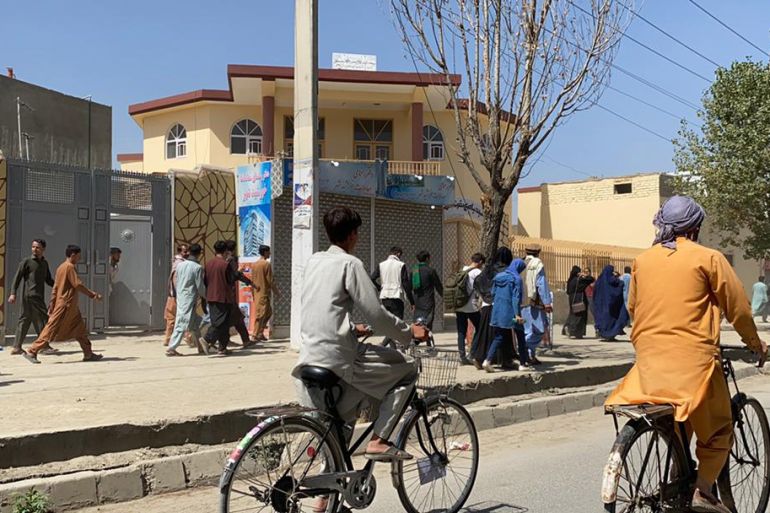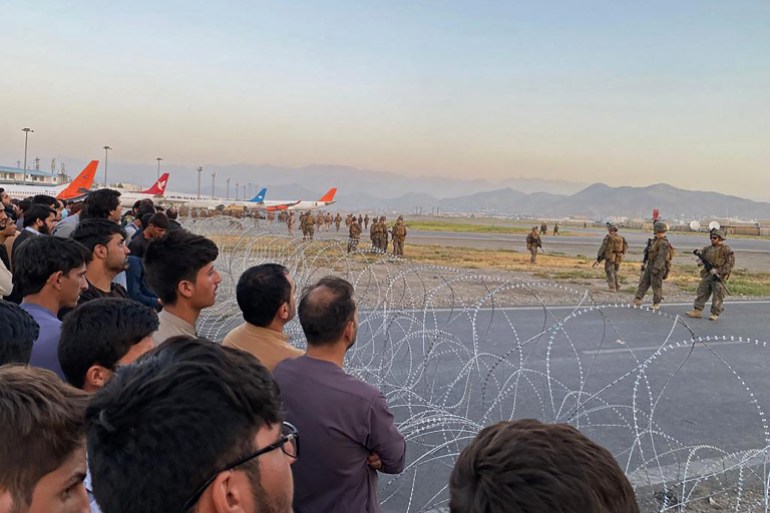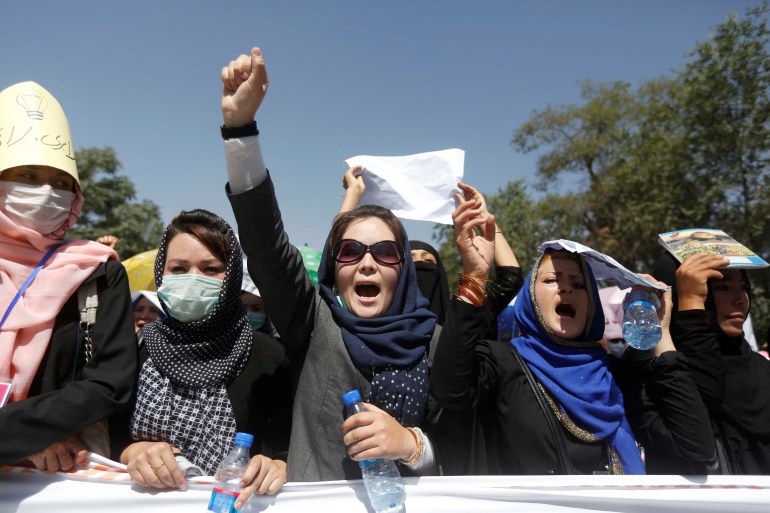‘Bring them to safety’: Desperate pleas from Afghan Australians
Australian government urged to expedite partner and family visas and launch rescue mission out of Kabul.

Thousands of Afghan Australians are desperately pleading with the Australian government to rescue their wives and children from Kabul as the Taliban takes control of Afghanistan.
MPs are reportedly receiving “desperate, heart-breaking requests for help” from Australian citizens and residents who have families stuck in the city.
Keep reading
list of 4 itemsMajor airlines reroute flights to avoid Afghan airspace
‘This is not Saigon’: Blinken defends US evacuations from Kabul
Afghanistan: Mapping the advance of the Taliban
Kai, an Afghan Australian of Hazara ethnicity whose wife is stranded in Kabul, says that unless she can get on an evacuation plane, he does not know what they will do.
As the Taliban advanced, she called Kai every night, crying.
“She’s not sleeping,” he told Al Jazeera. “She’s stressing, fully stressing.”
The Taliban claimed victory after entering Kabul on Sunday night.
Prime Minister Scott Morrison has said that Australia will begin evacuations in the coming days, with Australian Air Force planes heading to Afghanistan for the airlift, but at the moment it is not yet clear who will be on the flights.
Australian media says the rescue missions will focus on Australian citizens, Afghans who worked with Australian troops and their family members, “a contingent of Australian Defence Force personnel, Australian Border Force officials, diplomats and consular staff”.
The National Security Committee was meeting on Monday to discuss the plans.

There are about 50,000 Hazara people in Australia, most of whom fled Afghanistan in the late 1990s and early 2000s during the previous Taliban regime when they were targeted for their ethnicity and Shia beliefs.
According to Kai’s lawyer, Atika Hussain, a refugee lawyer and human rights advocate who is also Afghan and Hazara, Kai is just one of hundreds of Australian citizens and permanent residents with family in Afghanistan who have applied for partner visas but have been left waiting beyond the listed processing time.
Kai’s wife, who is Hazara like her husband, applied in January 2019 for a partner visa, which is supposed to be processed in 16 to 23 months.
As Taliban violence escalated in Afghanistan last year following the peace agreement between the Taliban and the US, Kai began asking for an urgent response to his wife’s visa application to get her out of the country.
In February of this year, he got in touch with his MP, Julian Hill, who forwarded the matter to Alex Hawke, minister for immigration, citizenship, migrant services and multicultural affairs.
“I’ve been worried [for] 2 and a half, 3 years almost, and they haven’t done anything,” Kai told Al Jazeera.
Last week, the Department of Home Affairs finally responded, saying it would not be possible to depart from the set priority order, with a suggestion to “consider seeking help from [his] treating medical professional or a counselling service”.
The letter then provided links to two well known mental health support organisations.
By this time, the Taliban controlled more than a quarter of Afghanistan’s provincial capitals and were continuing towards Kabul.
The situation has now become so urgent that even the expedited processing of delayed visas will not be enough for family members stranded in Kabul, says Atika.
“We are asking Australia to intervene and evacuate them even if they don’t have a visa,” she said. “Bring them to safety.”
Hiding affiliations
Atika, who also has family and other clients on the ground in Kabul, says people are starting to hide their identities and affiliations.
“People who are affiliated with any Westerners, they are destroying their documents,” she told Al Jazeera. “My other clients have also destroyed their family photos. Anything that shows that their husband or [any] family members are overseas… because what happens is [the] Taliban comes and they search the houses.”
In the worst-case scenario, Kai’s wife would destroy all her documentation, Kai says, but he is worried that she would still be at risk.
He says the Taliban usually goes house-to-house in a neighbourhood asking about those with family overseas, and everyone knows that he is in Australia.
“We’ve been married, we’ve been inviting all the people, like a thousand people, they all know,” Kai told Al Jazeera. “[And] I’m on social media, all my… posts are public… there’s no way I can hide, there’s no way.”
If the Taliban do find and “get close to” Kai’s wife, she has told him that she wants to have the option of killing herself.
“She said to me, she wants to go to the closest medicine [store]… to get some sort of [drug],” he said. “… That’s what she’s now thinking. I don’t know what to do.”
Being a woman without her husband makes Kai’s wife extremely vulnerable, says Kai.
“My [wife] is young, and she doesn’t have [any] kids, and even if she [tells them] yes, I’m married, are they going to believe? The Taliban doesn’t care,” said Kai.
When it was last in power more than 20 years ago, the Taliban enforced its strict interpretation of Islamic law, including banning women from studying or working, forbidding them from leaving home without a male guardian and requiring them to wear the all-enveloping robe known as a burqa. Women were stoned to death for accusations of adultery and public executions were common.
Amid its recent advance, there have been reports of similar measures put in place, and that Taliban leaders have been ordering girls over the age of 15 or widowed women under the age of 45 into forced marriages with the group’s fighters.
“These stories travel, and it has travelled to the young girls in Kabul… [and] they have to make a decision… whether to accept that fate to get forcefully married to a fighter or… protect [themselves],” said Atika.
“[If you kill yourself first] you won’t be dishonoured, your body won’t be dishonoured, your spirit won’t be dishonoured,” she said, “so that’s how they want to protect themselves.”
Another client of Atika’s has a wife and three young children in Kabul.
The family could not secure a visa to another country and because his wife is alone with the children, it is difficult for her to arrange an escape with a people smuggler.
“The smugglers, they take families who have a male supervisor,” Atika said. “Smugglers don’t want a woman and children because [they are] a liability.

Now the family is stuck in Kabul and, because of Australia’s COVID-19 restrictions, their father, another Australian citizen, cannot leave Australia to try to reach them, says Atika.
“Even if he [could travel], he won’t be able to find any ticket… it will take another two to three weeks,” she said. “He hasn’t got the time to wait for that.”
Atika spoke to him on Sunday.
“He was… almost crying. What should he do?” she said.
On Monday, the Australian government said it was considering expanding the number of Afghan refugees it accepts in light of the Taliban’s advance.
Kai wants to know why the family of an Australian citizen is not an evacuation priority, saying he can afford to support his wife and is not asking for a handout – he just wants her brought to safety.
“I’m an Australian citizen, I work hard for this country and… I’ve got my full rights,” he said. “Why is my [wife] there and they’re trying to [rescue people who have] been working [with Australia] for two or three years?”
In a response to questions from Al Jazeera, a spokesperson for the Department of Home Affairs said: “The Department is aware of the rapidly evolving situation in Afghanistan, and appreciates the anxiety of Family visa applicants and their sponsors in Australia.
“Partner and Child visa applicants who are located in Afghanistan are accepted as having compassionate and compelling circumstances, and do not need to separately request higher processing priority for the application.”
Applications would be ‘finalised as quickly as possible once all required information has been received and requirements are assessed,” the spokesperson added.
For now, all Kai can do is wait.
He says he is rarely weak and never thinks of suicide, but if Australia cannot rescue his wife there is little point to his life.
“Please… do it as soon as possible, at least send [her] to… the closest country,” he said. “We need them to make [her] safe.”